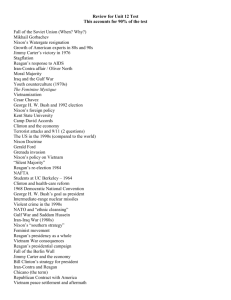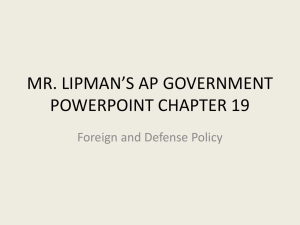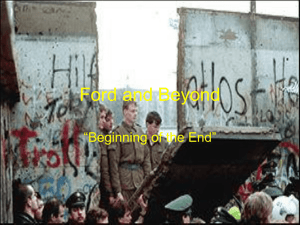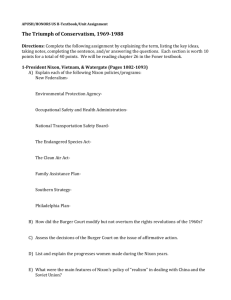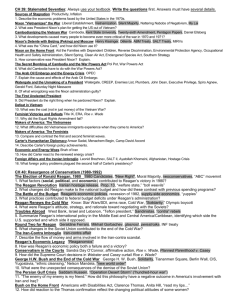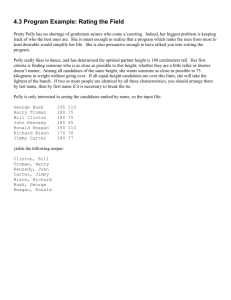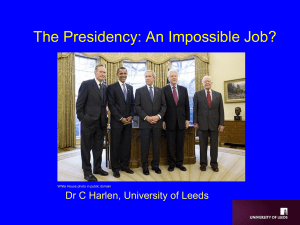File - US History at Rauner College Prep
advertisement
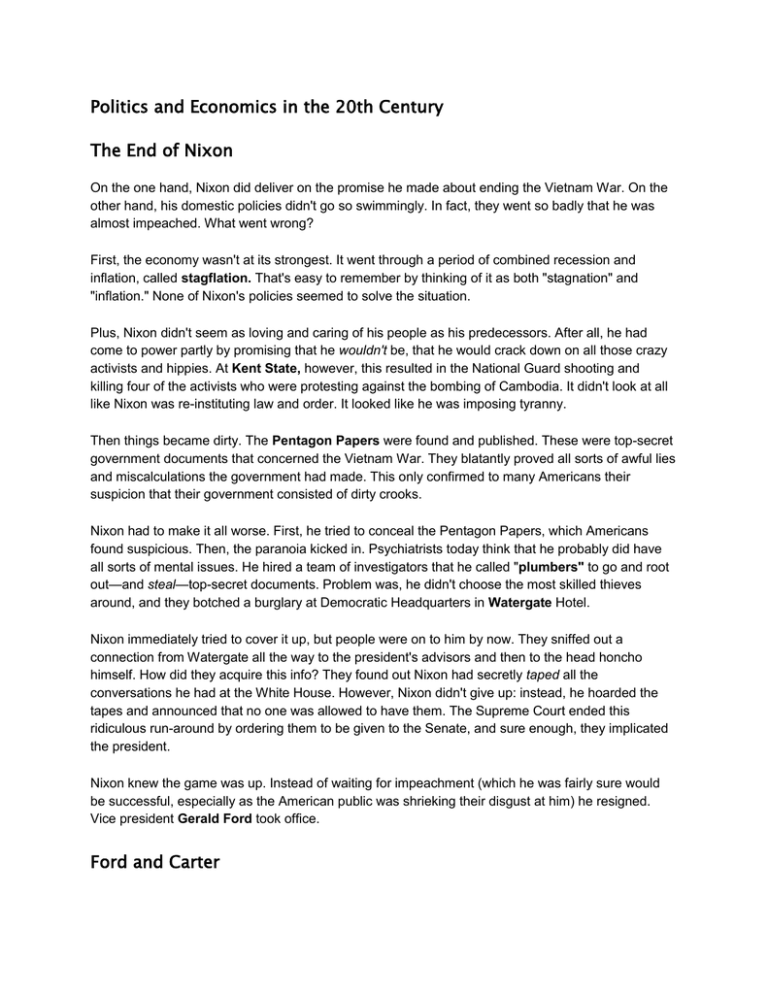
Politics and Economics in the 20th Century The End of Nixon On the one hand, Nixon did deliver on the promise he made about ending the Vietnam War. On the other hand, his domestic policies didn't go so swimmingly. In fact, they went so badly that he was almost impeached. What went wrong? First, the economy wasn't at its strongest. It went through a period of combined recession and inflation, called stagflation. That's easy to remember by thinking of it as both "stagnation" and "inflation." None of Nixon's policies seemed to solve the situation. Plus, Nixon didn't seem as loving and caring of his people as his predecessors. After all, he had come to power partly by promising that he wouldn't be, that he would crack down on all those crazy activists and hippies. At Kent State, however, this resulted in the National Guard shooting and killing four of the activists who were protesting against the bombing of Cambodia. It didn't look at all like Nixon was re-instituting law and order. It looked like he was imposing tyranny. Then things became dirty. The Pentagon Papers were found and published. These were top-secret government documents that concerned the Vietnam War. They blatantly proved all sorts of awful lies and miscalculations the government had made. This only confirmed to many Americans their suspicion that their government consisted of dirty crooks. Nixon had to make it all worse. First, he tried to conceal the Pentagon Papers, which Americans found suspicious. Then, the paranoia kicked in. Psychiatrists today think that he probably did have all sorts of mental issues. He hired a team of investigators that he called "plumbers" to go and root out—and steal—top-secret documents. Problem was, he didn't choose the most skilled thieves around, and they botched a burglary at Democratic Headquarters in Watergate Hotel. Nixon immediately tried to cover it up, but people were on to him by now. They sniffed out a connection from Watergate all the way to the president's advisors and then to the head honcho himself. How did they acquire this info? They found out Nixon had secretly taped all the conversations he had at the White House. However, Nixon didn't give up: instead, he hoarded the tapes and announced that no one was allowed to have them. The Supreme Court ended this ridiculous run-around by ordering them to be given to the Senate, and sure enough, they implicated the president. Nixon knew the game was up. Instead of waiting for impeachment (which he was fairly sure would be successful, especially as the American public was shrieking their disgust at him) he resigned. Vice president Gerald Ford took office. Ford and Carter Poor Gerald Ford. He was the only president in history who wasn't elected. All other vice presidents who had come to power at the death of the president were then re-elected for their own, full terms. Not Ford. First, he officially pardoned Nixon, which greatly annoyed a good many people. Secondly, his attempt to repair the economy with tax cuts and reduced government spending didn't work at all. Finally, he had the bad luck to be president when South Vietnam fell to the communists. Americans shook their heads and wondered whether they would ever have a capable president again. One idea was to bring in someone who wasn't a usual Washington crony. Jimmy Carter seemed to fit the bill—governor of Georgia and a peanut farmer. Who doesn't love peanuts? Plus, he seemed to be a nice guy, as well as intelligent, and he charmed people by admitting that he didn't know how to play the political game. Well…that was cute and all, but it turns out you need to know how the play the game when you're the president. And, most importantly, Carter also proved incapable of solving the nation's economic problems. To his credit, though, Carter did do some good things in the realm of foreign policy. For one thing, he crafted the Camp David Accords between Egypt and Israel, which created a shaky peace in the Middle East. Wow, peace in the Middle East? A miracle. Well…actually…Carter's presidency would see "hot wars" shift from Southeast Asia to the Middle East. This was partly because the Soviet Union was meddling there. In 1979, they had the gall to go and invade Afghanistan. The U.S. was totally sure they had their sights on the region's oil. Of course, America needed that oil to make sure its entire country ran smoothly. As a result, Americans stopped sending grain that Russia had asked for to keep its people from starvation. However, it wasn't only the communists who were making lots of noise and trouble at this time. A new problem had arisen: Islamic fundamentalists. They swiftly rose to power in Iran and put Ayatollah Khomeini in the ruling seat in 1979, who went and cut off the supply of oil. As if that wasn't enough, a group of Iranian college and high-school students kicked off the Iranian Hostage Crisis, capturing a group of Americans at the embassy in Tehran. Carter's rescue mission proved a disaster. To show exactly how mad America was at Russia and all the muck that was being stirred in the Middle East, Carter ordered a boycott of the Moscow Olympics. This was a nice "hardline stand" and all, but the problem was that Russia went ahead and won almost all the events. America had no opportunity to show how much better it was at everything, too. No opportunity for friendship or revenge. Would the Cold War ever end? As all you born in the Cold-War-free 90s know, yes it could. During the presidency of someone who most agree was a terrible Hollywood actor, but many feel was a great president: Ronald Reagan. Reagan By the late '70s, many Americans were exhausted from all the social upheaval of the '60s and '70s. Everyone had seemed to have a "movement" or a revolution. In the '60s, the students, the soldiers, the blacks, and youth. In the '70s, the feminists, the homosexuals, and other minorities like Native Americans, Mexican-Americans, and Asian Americans. Many middle-class, conservative, white Americans wanted someone who would collect all the pieces and glue them together into a recognizable America. Reagan presented himself as that leader. The "Reagan Revolution" was ushered in when he swept into office in 1980. He promised smaller government, lower taxes, and a stronger military to deal with what he called the "evil empire"—Russia. Reagan didn't mince words. Lots of federal programs were slashed and various industries deregulated, while defense spending increased. It also seemed, after two years or so, that he improved the economy, too. He had this idea called supply-side economics, or "trickle down" theory. If you stopped taxing and regulating big corporations, they would mass more money—and that money would "trickle down" into the hiring of more workers, the buying of more goods, and the reboot of the economy. Inflation went down. Employment went up, however, and it seemed that the rich didn't comply with "trickle down," because they didn't let the "trickle" happen. Instead, they hoarded the money in banks or used it to splash on luxury items. Reagan's whole idea of squeezing the federal government into a smaller, tighter little ball was called the New Federalism. He said the states could decide whether to fund that sort of thing. Federal taxes went down, but now everyone was angry at the states because their taxes increased. Problem was that as the federal government deflated, the balloon of its debt started mushrooming. The United States wasn't receiving that much money from taxes, but it was still spending a ton on defense. The federal budget deficit reached record heights. What exactly was Reagan spending it on? "Star Wars." No, it's in bold, it's totally legit. That was the name given to a space-based missile shield system called Strategic Defense Initiative (SDI). Reagan pointed out that "détente" (the easing of tensions with Russia from the Cold War) wasn't working. He reminded everyone that Russia was scary and had many bombs. Besides this sci-fi defense system, he revived the arms race again. Reagan was a real anti-commie warrior. He supported dictatorships and tyrannies in places like Panama, the Philippines, and Mozambique because they were anti-communist. He even sent in troops to topple a communist government in Grenada, and sent money to Nicaraguan "Contras" to oppose the communists there, too. The money for those guns came from Iran, where the government secretly sold weapons, and Congress had forbidden the president to send aid to the Contras because they were torturing and murdering civilians. Oops. Didn't look too good when it was all exposed. Kind of reminded people of how much government had been lying to them recently. The whole thing was called the Iran-Contra Affair. The good news about all this was that it sufficiently started to intimidate Russia. The Soviet Union hadn't been doing so well. The U.S, in the meantime, boasted of "Star Wars" and all sorts of new arms and missiles, and had someone at the helm who took a hard line to communism. Now the U.S. seemed to be gaining the upper hand. Plus, Mikhail Gorbachev came to power in the Soviet Union. He was still a full-on communist, but saw that his country was floundering—and he thought the only way to keep its head above water was to relax some policies. His first idea was glasnost (openness), which brought about an easing of social control. Previously banned western ideas could start slowly trickling in, and Russians didn't need to feel they lived under an all-seeing Evil Eye anymore. His second idea was perestroika (restructuring), which opened the Soviet economy to capitalism. Gorbachev hoped this would kick-start the sluggish Russian economic engine. As a part of this whole "easing" of communist restrictions, Gorbachev also decided to start backing down against the U.S. He and Reagan signed an agreement to dispose of their immediate-range missiles, and they worked together to try to ease conflicts in the rest of the world. The Cold War, under Reagan, was finally melting. George H.W. Bush It would finally turn to water and run into the gutter under George Bush. The Soviet Union, unable to control all the revolutions in Eastern Europe that were overthrowing the Iron Curtain, was crumbling. In 1989, protesters tore down the Berlin Wall—and the Russians couldn't do anything. Finally, on Christmas Day (cute, right?) the Soviet Union collapsed, and Gorbachev was forced from power. Boris Yeltsin became the Russian President, and immediately started working with Bush to dismantle the giant nuclear spider web they had made. Now that a second Republican had come to power, Americans thought maybe liberalism's back had been broken. Bush's domestic policies were similarly conservative—if not more—than Reagan's. Down with hippies, feminists, and protesters. Up with family values. Down with sex and drugs. Up with traditions, religion, and morality. Americans supporting Bush began to call themselves the moral majority. They wouldn't sit in parks smoking dope or run down boardwalks burning bras. So, communism had ended. Hurrah, world peace. Well…not so much. Because now that the communists were down, a new threat was rising: the Middle East. In the Persian Gulf War in 1990, the US launched Operation Desert Storm by raining an intense number of bombs on Iraq. This was punishment for their new ruler's (Saddam Hussein) seizure of oil fields in Kuwait. New thing to remember for the U.S. in this time period: oil = life blood. Cutting off access = not funny = war. The bombing worked, but Saddam Hussein remained in power. Even though U.S. inspectors nosed into Iraq to make sure there were no weapons of mass destruction, that fear wouldn't go away (as you all know, having lived through his son's presidency). Clinton, George W. Bush, and Obama Clinton was the first Democratic president America had had in a while. Under Clinton, the North American Free Trade Agreement (NAFTA), opened free trade with Canada and Mexico. Lots of people opposed this, because it looked like jobs were being sold to cheap immigrant labor, but it did look like a "nicer" foreign policy than America had had before. Plus, of course, Clinton was the second president to be impeached over the Monica Lewinsky scandal. The Senate, though, acquitted him, so Clinton stayed in office to finish his term. In 2000, it seemed Al Gore had beaten George W. Bush, because he had won the most electoral votes. Those results were questioned, however, due to some mishaps with the Florida votes, and George W. Bush was elected after a formal recount. The main things to know about Bush's presidency are twofold. First, something you likely remember: September 11th and the beginnings of the War on Terror. The troubles in the Middle East had boiled over, and now the threat of destruction came from Islamic fundamentalists instead of communists. American troops invaded Afghanistan and Iraq to topple the Taliban and Saddam Hussein. This "worked," but as you know, the situation in those counties was still incredibly unstable. It was a little like Vietnam—Americans came in to remove one government, but it didn't have the best plans for establishing a different one. It also didn't exactly make friends among the local people… The War on Terror saw a big increase in government power. Emergencies like war almost always do. The Patriot Act made the government a kind of spy on its own people. It was now able to monitor people's activities and arrest and investigate people suspected of terrorism. When weapons of mass destruction were not found in Iraq (and Bush had promised they would be), Americans started to become wary. Since the 60s, they had become increasingly jaded with government. Was it lying to them again? Plus, the economy took quite a tailspin, sparked by a mortgage crisis. America was plunged into what has begun to be called the Great Recession, scaring people into suspecting that the Great Depression itself was about to be played out all over again. When the economy goes bad, and a conservative president is at the help having reduced federal aid for social problems but increased money for defense…well, those are usually the ingredients for a pendulum swing. This was how the first African-American president, a Democrat, came to power: Barack Obama.
